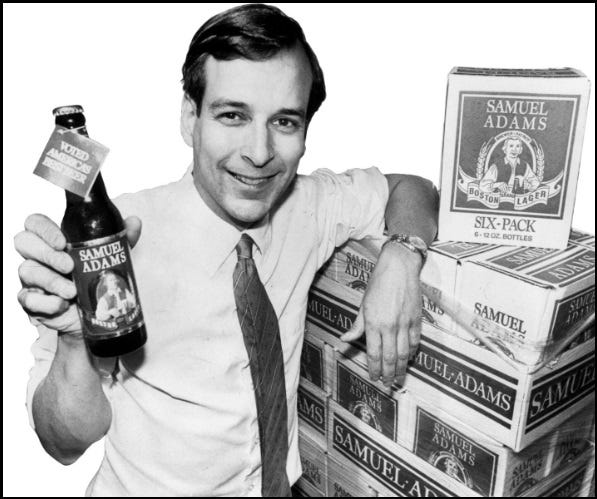Boston (Beyond) Beer
How SAM became a bet on "Twisted Tea" and "Truly"
That’s what Jim Koch’s father said when he learned that his son planned to leave his job at Boston Consulting Group (BCG) to start a small brewery.
That response had ample support from long-term industry trends: over the prior four decades, >90% of brewers throughout the country had shuttered their doors. But Koch planned to take a different approach to competing with dominant incumbents like Anheuser-Busch. Instead of another me-too product - “a water that will hold a head” – Koch’s company, Boston Beer, would target beer drinkers looking for a completely different experience:
“Trying to compete with [the industry goliaths] is like opening a restaurant to compete with McDonald’s. It’s just not going to happen. Even if your beer is just as good as theirs, or if your burgers are just as good as McDonald’s, you’re not going to be noticeably superior and you’re not going to change their competitive advantages or consumer habits. I’m going to do something different: I will make a noticeably, dramatically, almost shockingly different beer. Better is in the eye of the beholder… It’s not going to look, smell, or taste like any beer that a U.S. beer drink in 1984 has ever had. I’m going to open a gourmet restaurant – it doesn’t matter that there’s a Burger King on this corner and a McDonald’s on the next corner. I’m not going to get to their size – who is? – but I will be able to make a living.”
What Koch didn’t know when he started brewing “Boston Lager” in his kitchen in 1984 was that he stood at the beginning of a decades long wave in the alcoholic beverage industry; as he wrote in the 2023 annual report, he was “getting a new beer brand – a new beer category, really – up and growing”.
Helped by some notable accolades, including the “best beer” award at the Great America Beer Festival (GABF) four years running in the late 1980’s, “Samuel Adams” took off. The original business plan was 5,000 barrels and $1 million in sales within five years; instead, they got there in five months.
By the time of the 1995 IPO, annual net sales were ~$150 million – up >3x from three years earlier. (“The brewer will put clip-and-mail coupons on six-packs to sell stock as part of its IPO.”) For much of the next 20 - 25 years, the primary focus was riding the craft beer wave, led by its variety of beers under the “Samuel Adams” brand. At the same time, management had the foresight to invest in nascent alcoholic beverage categories, with brands like “Angry Orchard” (1997), “Twisted Tea” (2001), and “Truly” (2016). As former CEO Martin Roper noted, the broader portfolio gave Boston Beer a much larger addressable market: “The younger generation is more interested in a greater variety of experiences… Beer fits some of those roles, but not all of them.”
At one time, the “beyond beer” brands were a small part of the portfolio - but as I’ll discuss today, that completely flipped over the past 10-15 years.
This has significant implications for Boston Beer (SAM) shareholders.



